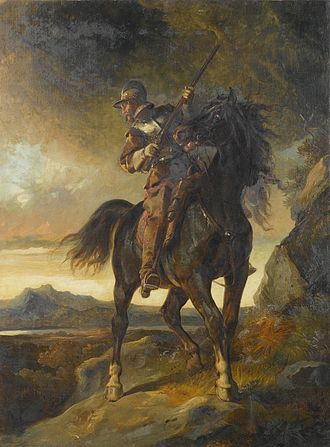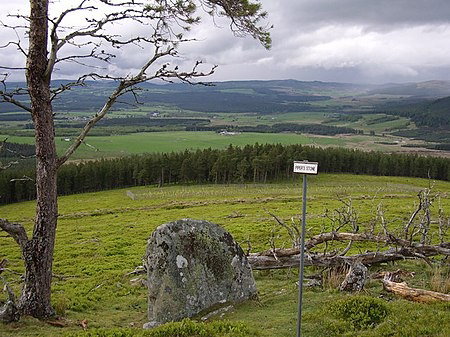The Moss-Trooper's Lament
Scott handed the song to Finlay Dun, a music teacher in Edinburgh who arranged the work which is set out at the bottom of this page
The Moss troopers were a type of brigand who appears to have emerged during the War of the Three Kingdoms, (1638-1652), and were first mentioned by that name in 1645 by a Act of Parliament, Scotland. They were landless bandits and thieves who hid in moorland, hills and inassessible places.
After Oliver Cromwell practically occupied Scotland by late 1651 after victory over Charles II at Worcester, Sept 3, Moss-Troopers commanded by Captain Patrick Gordon, nicknamed Stielhand the Mosser, and a German called Captain Augustine Hoffman operating from the Lothians, continued to resist the occupation through harrying supply lines and using guerrilla tactics. By January 1652 the cause was lost. Hoffman left for Norway.
In February 1652 the Cromwellian Republic declared that Scotland was now part of the Commonwealth.
The Moss-Troopers continued to be a burden, their numbers boosted by disbanded soldiers and Scottish veterans of the wars still carrying weapons and equipment.
They operated around the borders, and their raids would become a serious problem to civil authorities and civilians in Cumberland and Northumberland.
During the Royalist rising of 1653 to 1654 they attacked parliamentary forces. Whether their activities were that of brigands or they were politically motivated believing they were a resistance against the English Republic is difficult to say. There are no names of leaders or testimonies from the Moss-Troopers, so we don't know their story.
The song seems to be set at the time of the Restoration. Charles II had returned from the continent in 1660 but made his home in London. The Lament itself concerns the Moss-Troopers who with the return of the king were now expected to lay down their arms and live a life of peace with honest work.
However, the Moss-Troopers clearly didn't follow that plan and would become the subject of several severe Acts of Parliament in 1662, 1666, 1677, 1685, 1695, and on to 1700, 1712 and 1732.
Reading the acts themselves, the biggest problem was that the Moss-Troopers were using both sides of the border to escape justice, and whenever a crime was committed in England they would flee to Scotland, and if commited in Scotland they would flee to England.
Many communities, lacking the protection of the authorities, had been hiring their own horse troops to protect them.
The Acts were an attempt to impose a funded and incorruptible system of law and order to deal with the Moss-Troopers. The captured Moss-Troopers could expect execution, or exile with no right to return.
The Moss-Troopers Lament
Ilk water, moss and fell,
To a' your weel kent nooks and crooks,
Forever, Oh! Farewell!
For we'll go no more a roving,
A roving in the night,
We'll go no more a roving,
Though the moon shine e'er so bright.
O we'll go no more a roving!
Oh when the Har'est moon shone
What blithe times did we see!
On wanton naigs, wi splent on spauld,
We rade sae merrilie!
But we'll go no more a roving,
A roving in the night,
We'll go no more a roving,
Though the moon shine e'er so bright.
O we'll go no more a roving!
Our King's gane o'er the Border
In London for to dwell;
And friends we maun wi' England be,
Sin' he reigns there himsel:
And go no more a roving,
A roving in the night,
We'll go no more a roving,
Though the moon shine e'er so bright.
O we'll go no more a roving!
O how shall I, tether'd,
On Yarrow banks abide!
That far as Trent and Humber
Hae scour'd the Southrons wide.
Oh! to go no more a roving,
A roving in the night,
We'll go no more a roving,
Though the moon shine e'er so bright.
O we'll go no more a roving!
And how shall I follow
A droning plough's tail,
And how now break my bonnie Brown
To harl't like a snail!
And go no more a roving,
A roving in the night,
We'll go no more a roving,
Though the moon shine e'er so bright.
O we'll go no more a roving!
But when the blithsome Borders
Hae lost their riders gay,
The Scots will miss their hardy men,
And cry, Alack the day!
That they go no more a roving,
A roving in the night,
They go no more a roving,
Though the moon shine e'er so bright.
O they'll go no more a roving!




Comments
Post a Comment